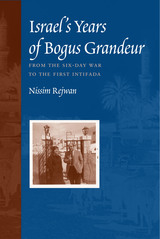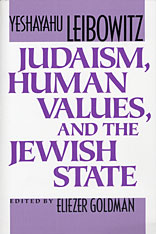
On the eve of the Six-Day War in 1967, Israel was nineteen years old and as much an adolescent as the average nineteen-year-old person. Issues of identity and transition were the talk among Israeli intellectuals, including the writer Nissim Rejwan. Was Israel a Jewish state or a democratic state? And, most frustratingly, who was a Jew? As Nancy Berg's foreword makes clear, these issues became more critical and complex in the two decades after the war as Israel matured into a regional power. Rejwan, an Iraqi-born Jew whose own fate was tied to the answers, addresses the questions of those days in his letters, essays, and remembrances collected in Israel's Years of Bogus Grandeur.
Israel's overwhelming victory in 1967 brought control of the former Palestinian territories; at the same time, Oriental Jews (i.e., those not from Europe) became a majority in the Israeli population. The nation, already surrounded by hostile, recently humiliated Arab neighbors, now had an Arab majority (Jewish, Muslim, Druze, and Christian) within its borders—yet European Jews continued to run the country as their own. Rejwan wrote tirelessly about the second-class status of Arab Israelis (and especially of Arab Jews), encouraging a more inclusive attitude that might eventually help heal the wounds left by the Six-Day War. His studies in sociology at Tel Aviv University informed his work. For his cause, Rejwan lost his job and many of his friends but never his pen. Through Munich, Entebbe, political scandals, economic crises, and the beginning of the Intifada, Rejwan narrates Israel's growing pains with feisty wit and unwavering honesty.

A biochemist by profession, a polymath by inclination and erudition, Yeshayahu Leibowitz has been, since the early 1940s, one of the most incisive and controversial critics of Israeli culture and politics. His direct involvement, compelling polemics, and trenchant criticism have established his steadfast significance for contemporary Israeli—and Jewish—intellectual life. These hard-hitting essays, his first to be published in English, cover the ground Leibowitz has marked out over time with moral rigor and political insight. He considers the essence and character of historical Judaism, the problems of contemporary Judaism and Jewishness, the relationship of Judaism to Christianity, the questions of statehood, religion, and politics in Israel, and the role of women. Together these essays constitute a comprehensive critique of Israeli society and politics and a probing diagnosis of the malaise that afflicts contemporary Jewish culture.
Leibowitz’s understanding of Jewish philosophy is acute, and he brings it to bear on current issues. He argues that the Law, Halakhah, is essential to Judaism, and shows how, at present, separation of religion from state would serve the interest of halakhic observance and foster esteem for religion. Leibowitz calls the religious justification of national issues “idolatry” and finds this phenomenon at the root of many of the annexationist moves made by the state of Israel. Long one of the most outspoken critics of Israeli occupation in the conquered territories, he gives eloquent voice to his ongoing concern over the debilitating moral effects of its policies and practices on Israel itself. This translation will bring to an English-speaking audience a much-needed, lucid perspective on the present and future state of Jewish culture.

The Israeli occupation of the Palestinian territories since 1967 has many important economic aspects that are often overlooked. In this highly original book, Shir Hever shows that understanding the economic dimensions of the occupation is crucial to unravelling the Israeli-Palestinian conflict.
Hever rejects the premise that Israel keeps control over Palestinian territories for material gain, and also the premise that Israel is merely defending itself from Palestinian aggression. Instead, he argues that the occupation has reached an impasse, with the Palestinian resistance making exploitation of the Palestinians by Israeli business interests difficult, but the Israeli authorities reluctant to give up control.
With traditional economic analysis failing to explain this turn of events, this book will be invaluable for students, activists and journalists struggling to make sense of the complex issues surrounding Israel's occupation.
READERS
Browse our collection.
PUBLISHERS
See BiblioVault's publisher services.
STUDENT SERVICES
Files for college accessibility offices.
UChicago Accessibility Resources
home | accessibility | search | about | contact us
BiblioVault ® 2001 - 2024
The University of Chicago Press









